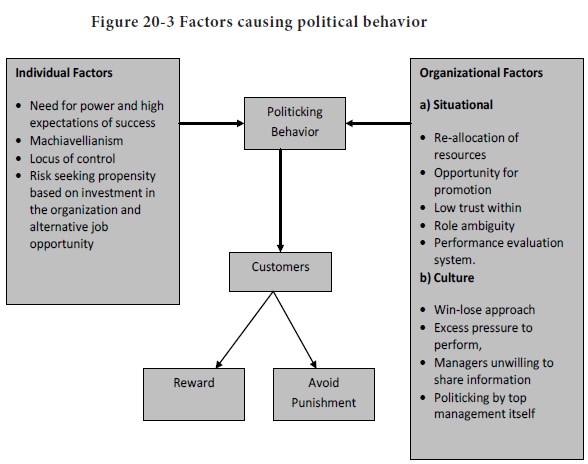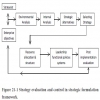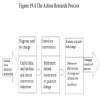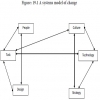Strategic Management - Strategy Implementation
Politics - Power, Politics And Leadership
Posted On :
Politics is the art of acquiring and enhancing power. Employees have a certain role to play.
Politics
Politics is the art of acquiring and enhancing power. Employees have a certain role to play. Therefore, their exercise of power is limited to a large extent by the role obligations. Political behavior is of two types.
Legitimate - It includes normal every day’s politics. It includes:
1. Complaining to one’s superiors,
2. By passing the chain of command,
3. Forming coalitions,
4. Obstructing organizational policies through excessive adherence to rules and
5. Developing
contacts outside through professional activities.
Illegitimate – It includes influences that are extreme and violate the implied “rules of the game.” Such activities include
2. Whistle blowing,
3. Symbolic protest such as wearing unorthodox dress and
4. Groups of employees cumulatively calling in sick.
It may be stated that the vast majority of political actions are of the legitimate variety. The reasons are pragmatic – the extreme and illegitimate forms of political behavior pose a very real risk of loss of organizational membership, or extreme sanctions against those who use them and then fall short in having enough power to insure that they work.
Research has indicated a number of factors, which can contribute to political behavior. Some of these factors are individual and derived from the unique qualities of the employees in the organization and others are derived from the organization’s internal culture or environment.

A few prominent individual factors are examined here.
i) Need for power and high expectations of success
Some managers who are status and ego driven often resort to politics to gain access to power corridors. They use the power for their personal growth and pleasures. Some managers who are in-charge of teams or units, may also engage in politics to safeguard their positions and have more benefits for their units. For effective management to take place, managers must be cautioned against the use of ‘Need for Power’ for personal means – to dominate others, seek loyalty for own self rather than the organization. It will always be preferable to adopt a ‘Need for power for institutional purpose’. This will help in creating a good work climate or culture for effective work and also help to develop subordinate’s understanding and loyalty to the organization.
ii) Machiavellianism
Machiavellians are people who use deceit and opportunism in interpersonal relations and manipulate others for their own purpose. Such Machiavellists also have a cynical view of the nature of other people and do not care for conventional morality. Obviously, politics of this kind is undesirable in organizations.
iii) Locus of control
Locus of control is the extent to which people believe that they can control events which affect them. Individuals can either have a high internal locus of control or a high external locus of control. Those individuals with a high internal locus of control hold a belief that events result primarily from their own behavior and are likely to engage in a political behavior in an attempt in influence other people. Those who have external locus of control believe in external forces from other individual managers, other groups or fate, which affect their success.
iv) Risk seeking propensity
Managers differ in risk taking. Some are risk seekers. Some
Organizational factors also influence the politicking in organizations. These are as follows.
Reallocation of resources – when organizations downsize the changes many stimulate conflict and politicking to have advantage in allocation.
Advancement or promotion – people resort to politics for quickly getting advancement or promotion in their careers
Low trust – A low trust within the organization can increase political behavior, which can become illegitimate also.
Role ambiguity – When there is confusion in the scope and functions, employees resort to politicking to have a favorable situation.
Politics is the art of acquiring and enhancing power. Employees have a certain role to play. Therefore, their exercise of power is limited to a large extent by the role obligations. Political behavior is of two types.
Legitimate - It includes normal every day’s politics. It includes:
1. Complaining to one’s superiors,
2. By passing the chain of command,
3. Forming coalitions,
4. Obstructing organizational policies through excessive adherence to rules and
Illegitimate – It includes influences that are extreme and violate the implied “rules of the game.” Such activities include
1. Sabotage,
2. Whistle blowing,
3. Symbolic protest such as wearing unorthodox dress and
4. Groups of employees cumulatively calling in sick.
It may be stated that the vast majority of political actions are of the legitimate variety. The reasons are pragmatic – the extreme and illegitimate forms of political behavior pose a very real risk of loss of organizational membership, or extreme sanctions against those who use them and then fall short in having enough power to insure that they work.
Factors Causing Political Behavior
Research has indicated a number of factors, which can contribute to political behavior. Some of these factors are individual and derived from the unique qualities of the employees in the organization and others are derived from the organization’s internal culture or environment.

A) Individual Factors
A few prominent individual factors are examined here.
i) Need for power and high expectations of success
Some managers who are status and ego driven often resort to politics to gain access to power corridors. They use the power for their personal growth and pleasures. Some managers who are in-charge of teams or units, may also engage in politics to safeguard their positions and have more benefits for their units. For effective management to take place, managers must be cautioned against the use of ‘Need for Power’ for personal means – to dominate others, seek loyalty for own self rather than the organization. It will always be preferable to adopt a ‘Need for power for institutional purpose’. This will help in creating a good work climate or culture for effective work and also help to develop subordinate’s understanding and loyalty to the organization.
ii) Machiavellianism
Machiavellians are people who use deceit and opportunism in interpersonal relations and manipulate others for their own purpose. Such Machiavellists also have a cynical view of the nature of other people and do not care for conventional morality. Obviously, politics of this kind is undesirable in organizations.
iii) Locus of control
Locus of control is the extent to which people believe that they can control events which affect them. Individuals can either have a high internal locus of control or a high external locus of control. Those individuals with a high internal locus of control hold a belief that events result primarily from their own behavior and are likely to engage in a political behavior in an attempt in influence other people. Those who have external locus of control believe in external forces from other individual managers, other groups or fate, which affect their success.
iv) Risk seeking propensity
Managers differ in risk taking. Some are risk seekers. Some
(B) Organizational Factors
Organizational factors also influence the politicking in organizations. These are as follows.
Reallocation of resources – when organizations downsize the changes many stimulate conflict and politicking to have advantage in allocation.
Advancement or promotion – people resort to politics for quickly getting advancement or promotion in their careers
Low trust – A low trust within the organization can increase political behavior, which can become illegitimate also.
Role ambiguity – When there is confusion in the scope and functions, employees resort to politicking to have a favorable situation.
Tags : Strategic Management - Strategy Implementation
Last 30 days 718 views















